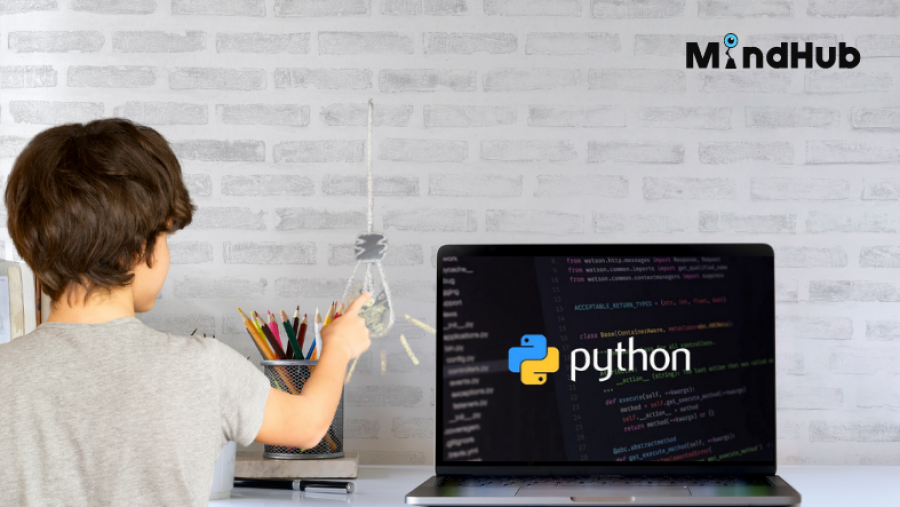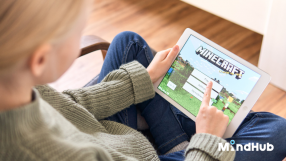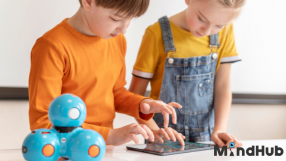
Today there is a very large variety of programming languages and each of them has a different degree of complexity and use. Python is one of the easiest to learn, but also among the most effective programming languages. This is what makes it one of the most popular and the choice of most beginners. It is easy to learn, understand and use. With its easy-to-learn structure, it is perfect for children, who, above all, should be able to easily get used to the specifics of programming and the logic that follows.
Python can be applied for a variety of purposes and tasks, and by learning it, a child can gain valuable knowledge as well as build a foundation for their career. After all, this is the language that drives the world's second-largest search engine - YouTube.
The right programming language not only develops logical thinking but also handling "code", solving problems and finding solutions for each case.
Python is undoubtedly one of the most easily recognizable languages and a basic one in starting in the world of programming. And why is it suitable for your children? Learn with MindHub!
Why choose Python?
Learning programming languages by children can be both enjoyable and challenging. That is why MindHub strives to focus its training on innovative methods that will help to easily perceive the otherwise not always pleasant material. Our program was created with the intention of evolving knowledge - from easier languages and actions to each subsequent step, which will improve general knowledge and skills.
Apart from the fact that with the help of the mentors, the children can perceive the new knowledge much easier, they also deal with Phyton very intuitively.
Why is it so suitable?
Reason 1: Sustainable language
There are programming languages designed for beginners. They are purely graphical and are called "block" languages. Such is for example Scratch, which is a good language for children in primary school, but quickly outgrows them. This is not the case with Python, and it remains as easy as it is challenging and always offering new horizons to upgrade.
Python is also considered the language of data science, machine learning and artificial intelligence - all areas that are highly looked for in our current economy. These areas will also be of great value in our future where technology has headed, so this skill also has sustainable value.
Reason 2: Easy to understand
The most difficult part of programming for beginners is understanding new ideas and concepts. Most computer languages require a lot of learning before the fun begins. You have to learn a difficult syntax first. Most beginners, especially children, quickly become frustrated and lose interest or develop an unpleasant sense of programming before they even start writing the actual code.
Unlike most programming languages, Python syntax is short and easy to read by humans. It reflects human language far better than any other programming language, making it ideal for kids.
Writing code in Python is like writing commands in English. As beginners, children quickly learn the basics and learn how to use this language to develop games and animation.
Reason 3: The future is in it
The popularity of Python will only continue to grow, and many experts believe that the language has constant strength due to its power, easy foundation, and the fact that much of the Python code already developed will need support for years to come.
Although Python has changed and evolved over the years, the structure of the language still remains relatively unchanged. The same methods and functions from a decade ago are almost identical to those used today.
Once children learn the basics of Python coding, their skills will never become obsolete. While you may think it's too early to prepare your child for his or her future profession, Python seems to be around for a long time to come, and the starting salaries for Python-qualified programmers are some of the highest. Maybe it's worth keeping that in mind?
What is the best way for children to learn to program with Python?
Sometimes for children, strange combinations of words and punctuation may seem impossible to decipher. This can be difficult and can lead to them feeling like they don't understand anything, but the truth is that Python is much easier than it looks.
Like any other skill, it simply requires practice. Regular practice of skills is mandatory so that the child can get used to the logic of the language and start to build projects, solve problems and improve their knowledge. Practice has always been and will continue to be the foundation of successful teaching.
In the second place, however, is the correctly presented information and the easy perception of the material. At MindHub, this is done with the help of our mentors.
They make the courses fun, highly engaging and ideal for children. Teaching Python to children through creative projects that interest them is a winning combination. MindHub already has several Python coding courses for children of all ages, starting with the basics of Python and progressing to a course where students learn to program their own game from scratch!
If you want to give your child a chance to get to know the world of Python, start with a free demo and see for yourself the success of the program.


